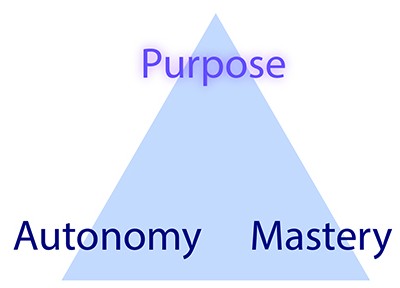Engaging staff on a limited budget – the final post
By Darryl Stewart, Head of the Herd
This is the last of three posts on engaging staff without more pay.
In the first post two posts, I talked about autonomy and mastery.
To summarize:
Autonomy – give people more control over things like when, how and even with whom, they do the work. This helps them feel in control of their situation.
Mastery – when you find something that really floats someone’s boat, do everything in your power to get them doing more of this and find ways to give them training, feedback and extra support in this area. This helps them feel good about getting good at something they like.
Understanding and using these two things can improve engagement on your team and this equals better results and lower staff turnover in our organizations. It will also make our jobs as managers more rewarding and interesting.
 This final post is about purpose.
This final post is about purpose.
In the book DRiVE by Daniel Pink, the author talks about a call centre study with a group of call centre representatives. Their job was to raise funds for a university. They were split into three groups and each was briefed differently at the start of each shift over a period of time.
The first group was reminded of the personal benefits of working at this job – earning money, developing skills, etc.
The second group was told stories from people who had received scholarships from the funds that were raised and how this had improved their lives.
The final group was a control group; they received no briefings as usual.
What were the results?
The group reminded of what was in it for them, did no better than those in the control group. But the people in the second group who were reminded what their work accomplished, raised more than twice as much money, through twice as many pledges, as the other groups.
The application of the human craving for purpose in our organizations is powerful. Talking about WHY we do what we do is far more powerful than talking about how much we get paid and what is in it for each person directly.
The challenge for businesses is to have a “why” that makes sense. For IBEX our why is to make the lives of working people easier. We talk about how tough the jobs are of the people we serve. The entrepreneur trying to do all the administration herself, the office manager over worked and under-appreciated in a medium sized company or the payroll coordinator rushing to meet deadlines in a larger organization. We can make their lives better by doing our jobs well, going the extra mile for them. If we make their lives easier through service or systems , they go home happier to their families, they have more energy for what matters to them and we get the same too- we go home happier and more energized and more ready to make a difference than if we just put in our time to push out the payrolls.
Starting off people in your organization with a good dose of WHY seems like an amazing idea to me. Backing it up further, by having the front line supervisors make it part of regular discussions with their teams, would take the application of purpose to new levels.
If you have a great example of applying purpose, how you helped your team understand why, pass it on. The first person who sends me a great example will receive a free copy of DRiVE. Email me or post a comment and I will send you the book!